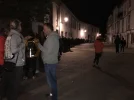Kanga, you are correct, in that they shut off the kiosks when enough numbers have been issued to keep them busy through closing. Overtime is not paid and staff DO have families and responsibilities outside their jobs, as do we all.
Allow me to expand, and explain why this is the case, and a problem.
Decades, and longer, ago priests, monks, brothers and seminarians did this job. Their labor was free, per se. But the volumes of arriving pilgrims were FAR lower than they are at present and into the future. Free labor is never the answer.
The issue is not the number of volunteers working per se. At this time of the year, at the end of the 'informal annual Camino season,' there are far fewer, like nil, two-week term volunteers working from around now until next Semana Santa (@ 14 April 2020)
As the days and weeks pass, the volunteers go away and only the paid staff remains. The entire paid staff is maybe 10 - 12 people. Some are part-timers. But, issuing Compostelas is only one of the things this staff does, albeit the largest volume.
If you ever owned or managed a service-oriented business that was open seven days a week, 363 days of the year (closed ONLY on Christmas and New Years Days), and having to cover two shifts every day, you can readily see that 10 -12 people are not going to go far. Plus, consider that although each person works a SIX-day week, having only one rotational day off, this means they can be scheduled a maximum of six shifts weekly.
Hence, mathematically, there are 14 basic shifts to be covered. Also, there are back-room and management responsibilities that must be accomplished on a daily basis. This includes supplying bulk quantities of credentials from this office all over Europe. Someone needs to do it.
Then too, there are the responsibilities to provide statistics, both for the daily pilgrim Mass and the reporting system writ large.
At
least, two-full people shift-equivalents daily are consumed by these, and other directly-related pilgrim office duties. A 'shift-equivalent' is the person-hours needed to accomplish these duties. They can frequently be dealt out among the dozen or so staff, so each person helps a little. But, this in turn, reduces the time they are available to produce Compostelas.
So, you either add four shifts to the already calculated 14 required each week, or subtract three bodies from the 10 - 12 available on the roster. So, and let's add shifts for ease, say we need to cover 18 scheduled shifts but I have only 12 people, each working 6 shifts.
So my total resource is 72 person shifts and I need to cover 14 shifts. Mathematically, that means that, on average, I can only schedule about 5 people per shift. Even if I play with the numbers to schedule more folks in the morning when pilgrim demand is highest, I cannot sustain this rate through closing time.
Oh, I forgot, as an integrity-enhancing measure, they regularly assign one staff person, never a volunteer, to operate the cash register. This reduces the 5 people each shift to only 4 on average.
Also, and I intentionally did not include this, I made no provisions for sick days, personal days, sick children, sick parent, broken car, home repair, etc., requiring an employee to stay away from work, etc. To the extent that paid staff get paid holidays, these can ONLY be taken in the very off-season.
So, can you see the problem? It's the proverbial Texan stuffing of 20-gallons of cow manure into a 10-gallon cowboy hat... It does not fit.
That they get as many Compostelas done as they do is a testament to how hard they work, and the frequent, but irregular and frequently unpredictable drop-in volunteers. These include:
- Other cathedral staff, like the ACC staff (2) and Arcofraternity de Apostol Santiago staff (1), who work elsewhere in the building,
- Veteran pilgrims, like myself or perhaps some of you, who will come into town, perhaps off their Camino, and have a couple of days to offer to help out.
- Local seminarians who can dedicate only a few hours in between their studies.
- Local priests assigned to the University or one of the seminaries, who also might have limited and sporadic time to jump in to help.
As I have mentioned separately, the other issue is that the 2019 season has stretched longer, into September and perhaps October, as more and more pilgrims are seeking to avoid summer crowds. We all know this is going to worsen long before it ever improves.
The sole solution, IMHO is to try to encourage more pilgrims to volunteer more months. Instead of seeking to volunteer from May through the end of August, the office desperately needs as many volunteers as it can get from Semana Santa, at least through the middle of, and likely the end of October. Again, and as I have stated, hiring more paid staff is also not inthe cards. Remember the Compostela, the largest volume product this office cranks out, remains FREE.
And, THAT is my current projection. Once the Holy Year arrives in 2021, all bets are off...
Hope this helps explain the facts of life at the Pilgrim Office in Santiago.



























